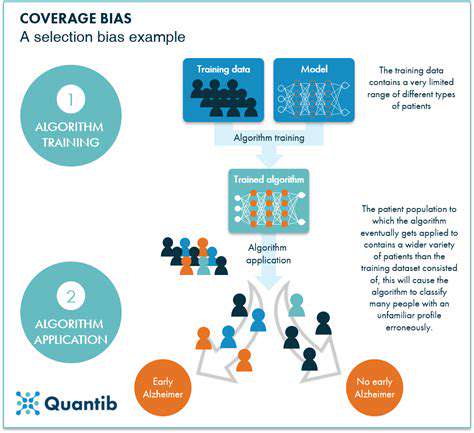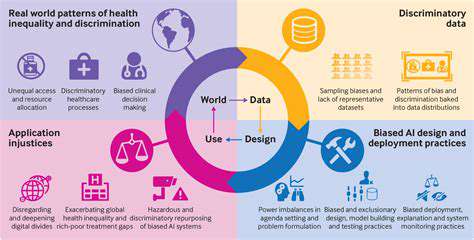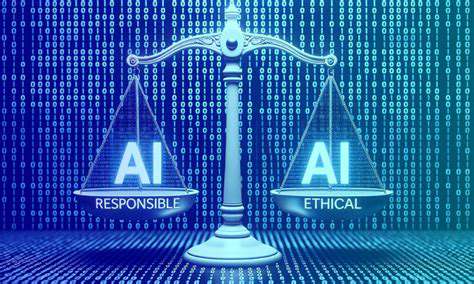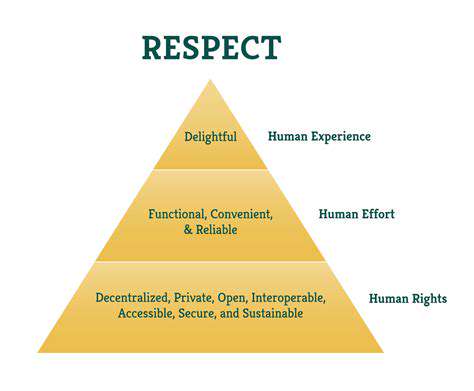Digital Citizenship in the Classroom: Teaching Responsible Tech Use
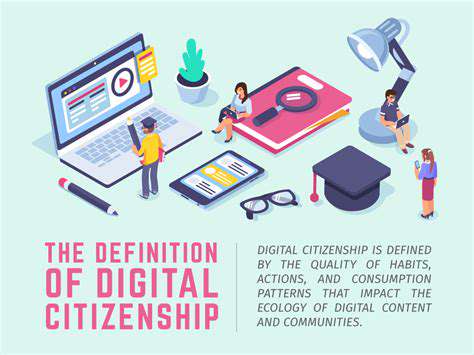
Defining Digital Citizenship: Beyond the Basics
Digital citizenship encompasses a wide range of responsibilities and expectations in the digital age. It's not simply about using technology; it's about understanding and adhering to ethical principles, online safety protocols, and responsible digital behaviors. This includes recognizing the potential for harm and taking proactive measures to mitigate negative impacts. It's a dynamic concept that evolves alongside technological advancements.
Understanding digital citizenship goes beyond simply knowing how to use a computer or navigate a website. It demands a nuanced understanding of the ethical considerations and social implications that arise from our online interactions. This includes respecting others' opinions, avoiding cyberbullying, and promoting positive online discourse.
Key Components of Digital Citizenship
A critical component of digital citizenship is media literacy. This involves the ability to critically evaluate information encountered online, differentiating between credible and unreliable sources, and recognizing potential biases. This skill is crucial in navigating the ever-growing volume of information available online.
Another key element is responsible online communication. This includes being mindful of the tone and language used in online interactions, avoiding harassment or bullying, and recognizing that online actions have real-world consequences.
Online Safety and Security
Protecting personal information online is paramount in digital citizenship. Understanding how to safeguard sensitive data, recognizing phishing attempts, and using strong passwords are essential skills for navigating the digital world safely.
Staying aware of online threats, such as malware and scams, is also a crucial aspect of digital citizenship. Taking proactive steps to protect personal information and devices from harm is vital in maintaining a safe and secure online experience.
Digital Etiquette and Respect
Digital citizenship emphasizes the importance of respecting others' opinions and perspectives in online discussions. This includes refraining from cyberbullying, hate speech, or any form of harassment.
Promoting positive online interactions and fostering a sense of community online are core values of digital citizenship. Respecting others' online presence and avoiding actions that could harm or offend others is essential for building a positive digital environment.
Digital Rights and Responsibilities
Understanding and adhering to digital rights and responsibilities is fundamental to digital citizenship. These rights often involve access to information, freedom of expression, and the right to privacy, while responsibilities include respecting copyright, avoiding plagiarism, and understanding the legal implications of online actions.
Digital Inclusivity and Accessibility
Digital citizenship promotes inclusivity and accessibility for all users. This involves understanding the diverse needs and perspectives within the online community. It also includes ensuring that online resources and platforms are accessible to everyone, regardless of their background or abilities.
Promoting digital literacy and inclusivity is a key aspect of building a more equitable and welcoming online environment. A digitally inclusive environment fosters mutual understanding and respect.
Building a Foundation: Key Concepts of Digital Citizenship
Understanding Digital Identity
Digital identity is the online persona you project to the world. It's crucial to understand that your online actions create a digital footprint, a collection of information that others can access. This footprint is a significant part of your overall digital identity, and it's important to be mindful of what you share and how you represent yourself online. It's not just about your social media profiles; it includes any online activity, from forum posts to online game interactions. A thoughtful approach to managing this digital footprint is essential for establishing a positive and trustworthy digital identity.
Consider the various online spaces you frequent. How do you present yourself in these different contexts? Are your online interactions consistent with your offline values and beliefs? Maintaining a consistent and respectful digital identity is key to building positive relationships and avoiding potential conflicts or misunderstandings online. Understanding digital identity means understanding the lasting impact of your online presence.
Respecting Others Online
Digital citizenship emphasizes the importance of respecting others online. This involves understanding and upholding ethical behavior in online interactions. It's about being mindful of the impact your words and actions can have on others. Cyberbullying, harassment, and hate speech are serious violations of digital citizenship principles and have real-world consequences. Respecting others online means being considerate, empathetic, and avoiding harmful or offensive content.
Building a positive online community requires active participation in upholding digital etiquette. This includes avoiding the spread of misinformation, respecting different opinions, and engaging in constructive dialogue. Being a responsible digital citizen means actively contributing to a positive and inclusive online environment. Remember that your actions have repercussions, and choosing to be respectful shapes the online experience for everyone.
Digital Responsibility and Safety
Digital responsibility encompasses a range of actions and attitudes that contribute to a safe and positive online environment. It's about being aware of the potential risks and challenges associated with technology, and taking proactive steps to mitigate those risks. This includes protecting your personal information, being cautious about clicking links or downloading files, and understanding the importance of privacy settings. Responsible online behavior is about protecting yourself and others from harm.
Safety online is paramount. Being aware of potential online threats, from scams to cyberbullying, is crucial. Building a strong sense of online safety involves educating yourself about common risks, developing critical thinking skills to evaluate online information, and knowing how to report inappropriate behavior. Safeguarding yourself and others online requires vigilance and a proactive approach to protecting your digital well-being.
A crucial aspect of protecting your smart home is securing your network. A strong Wi-Fi password is the first line of defense. Avoid using easily guessed passwords and opt for a combination of uppercase and lowercase letters, numbers, and symbols. Consider using a password manager to generate and store complex passwords securely, making it easier to manage multiple devices.
Integrating Digital Citizenship Across the Curriculum
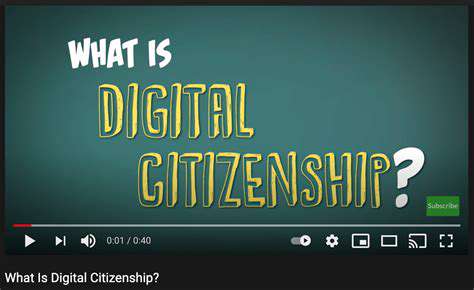
Defining Digital Citizenship
Digital citizenship encompasses the responsible and ethical use of technology in the digital age. This includes understanding and adhering to online safety guidelines, recognizing and avoiding cyberbullying, and respecting the rights and opinions of others online. It's a crucial skill for navigating the complexities of the internet and social media. Understanding the digital landscape, including the potential risks and benefits, is paramount for all users.
It's more than just knowing how to use technology; it's about understanding the social, ethical, and legal implications of our online actions. Digital citizenship is a continuous learning process, requiring ongoing adaptation to the ever-evolving digital world.
Promoting Digital Literacy
Digital literacy is a fundamental aspect of digital citizenship. It involves the ability to access, evaluate, and create information using digital tools and resources. This includes critical thinking skills to discern credible information from misinformation and the ability to navigate diverse online platforms effectively. It also encompasses understanding how to use digital tools responsibly and safely.
Developing digital literacy skills equips individuals with the knowledge and competencies to effectively engage with digital content. This includes recognizing and avoiding online scams, safeguarding personal information, and understanding the importance of copyright and intellectual property rights.
Cultivating Online Safety
Online safety is a critical component of digital citizenship. It encompasses protecting oneself from online risks, including cyberbullying, harassment, and online predators. Knowledge of online safety protocols is essential to mitigating risks and fostering a positive online experience. This involves understanding how to report inappropriate online behavior and how to create strong passwords and secure accounts.
Understanding the potential dangers of sharing personal information online and the importance of privacy settings are key aspects of online safety. Familiarizing oneself with these concepts can effectively limit the risks associated with online activity.
Encouraging Ethical Online Behavior
Ethical online behavior is fundamental to fostering a positive and respectful digital environment. This includes respecting the rights and opinions of others, avoiding cyberbullying and harassment, and recognizing the importance of digital etiquette. It's crucial for creating a positive online community and fostering constructive dialogue. Understanding and practicing these principles is vital for creating a safe and supportive digital space for everyone.
Being mindful of the impact of our online actions on others is a key component of ethical online behavior. This includes considering the potential consequences of sharing information and engaging in discussions online. It requires us to be considerate and respectful of others' opinions and experiences.
Addressing Digital Responsibility
Digital responsibility involves understanding the consequences of our online actions and being accountable for them. It encompasses recognizing the potential harm that can be caused by irresponsible online behavior and the importance of making informed decisions. Digital responsibility involves making choices and actions that support a positive and respectful online community.
Taking ownership of our online footprint and actively participating in shaping a positive online environment are key aspects of digital responsibility. Understanding the impact of our online actions on others and being accountable for the content we share is crucial. This includes being mindful of the potential for spreading misinformation and harmful content.
Fostering Digital Empathy
Digital empathy involves understanding and considering the perspectives of others in the digital space. This includes recognizing that online interactions can have a significant impact on individuals and understanding the potential for online communication to be misinterpreted. Practicing digital empathy is essential for creating a more inclusive and respectful online environment.
Being mindful of the potential for online communication to be misinterpreted and actively seeking to understand the perspectives of others in the digital realm is a critical component of digital empathy. It involves recognizing the diversity of experiences and opinions online and making a conscious effort to communicate with respect and understanding.
Assessment and Evaluation: Measuring Success in Digital Citizenship
Defining Digital Citizenship
Digital citizenship encompasses the responsible and ethical use of technology and online platforms. It involves understanding and adhering to online etiquette, respecting others' opinions and privacy, and recognizing the potential risks and benefits associated with the digital world. This includes comprehending the importance of digital literacy and using technology to promote positive social change and personal growth. It's a multifaceted concept that goes beyond simply knowing how to use a computer; it's about understanding the social, ethical, and legal implications of our online actions.
Assessing Digital Literacy Skills
Evaluating digital literacy skills involves a multi-faceted approach. This encompasses the ability to locate, evaluate, and use information effectively, as well as the capacity to communicate and collaborate online in a constructive and responsible manner. It includes proficiency in various digital tools, from word processing and spreadsheets to social media and online research platforms. Furthermore, it requires critical thinking skills to discern credible information from misinformation and to navigate the complexities of the digital environment safely and effectively.
Evaluating Online Interactions
Assessing online interactions centers on understanding and applying digital etiquette. It's crucial to evaluate how individuals communicate, collaborate, and engage with others online. This involves examining their ability to express themselves clearly and respectfully, participate in discussions constructively, and resolve conflicts peacefully. It also includes recognizing and avoiding cyberbullying, harassment, and other harmful online behaviors. A key aspect is promoting positive interactions and fostering a sense of community online.
Measuring Ethical Conduct Online
Ethical conduct is a cornerstone of digital citizenship. Evaluating this aspect involves examining how individuals navigate ethical dilemmas in the digital realm, including issues like plagiarism, copyright infringement, and online privacy. It's essential to assess their understanding of intellectual property rights, their ability to respect others' privacy, and their commitment to responsible data usage. Promoting ethical decision-making and accountability online is crucial to fostering a positive and trustworthy digital environment.
Identifying and Addressing Online Risks
Recognizing and mitigating potential risks is a vital component of digital citizenship. This involves assessing individuals' awareness of online threats, including cyberbullying, scams, and misinformation. It's important to evaluate their ability to identify and avoid harmful content, protect their personal information, and report inappropriate behavior. This includes understanding the importance of strong passwords, secure online practices, and safe online environments for children and young adults. It also needs to consider the importance of resilience in the face of online harassment and negativity.
Evaluating the Impact of Digital Technologies
Assessing the impact of digital technologies on individuals and society is paramount. This involves evaluating how the use of technology affects communication patterns, social interactions, and overall well-being. It's essential to examine the potential benefits and drawbacks of technology on various aspects of life, including education, employment, and personal relationships. Furthermore, it requires a critical analysis of the power dynamics inherent in the digital sphere, considering how technology can be used to promote inclusion or exclusion, and how it can affect perceptions of identity and self-worth. Evaluating this aspect is vital for shaping a more equitable and sustainable digital future.
Read more about Digital Citizenship in the Classroom: Teaching Responsible Tech Use
Hot Recommendations
- Attribution Modeling in Google Analytics: Credit Where It's Due
- Understanding Statistical Significance in A/B Testing
- Future Proofing Your Brand in the Digital Landscape
- Measuring CTV Ad Performance: Key Metrics
- Negative Keywords: Preventing Wasted Ad Spend
- Building Local Citations: Essential for Local SEO
- Responsive Design for Mobile Devices: A Practical Guide
- Mobile First Web Design: Ensuring a Seamless User Experience
- Understanding Your Competitors' Digital Marketing Strategies
- Google Display Network: Reaching a Broader Audience

